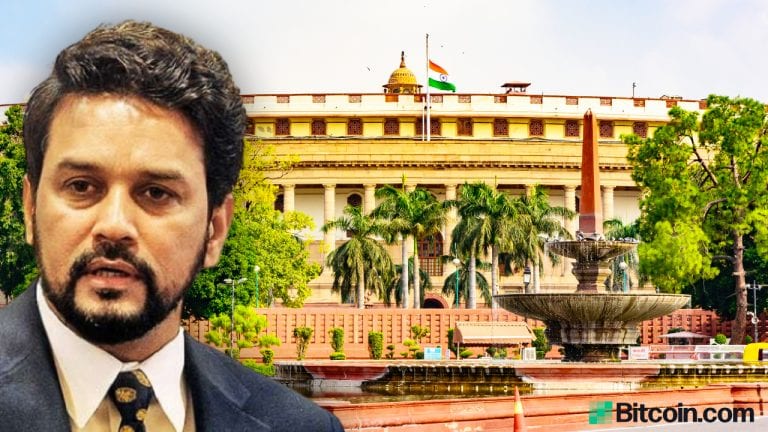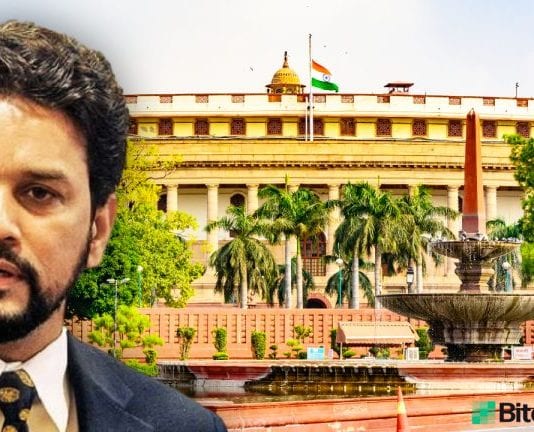
The Indian government has spoken about the cryptocurrency bill again. This time, the minister of state for finance has clarified the status of the crypto bill that is expected to be introduced in parliament during the current session.
Indian Ministry of Finance Clarifies Crypto Bill Status
The subject of bitcoin and the cryptocurrency bill in India was raised on Tuesday in Rajya Sabha, the upper house of India’s parliament. Recently, the crypto bill was listed to be introduced in Lok Sabha, the lower house of parliament. The bill seeks to ban cryptocurrencies while creating a regulatory framework for the central bank digital currency to be issued by the Reserve Bank of India (RBI).
Since its Lok Sabha listing was made public, questions have been raised in Rajya Sabha about the crypto bill. Last week, Minister of State for Finance Anurag Thakur clarified the government’s position on cryptocurrency and the digital rupee.
On Tuesday, more questions were raised in Rajya Sabha about the cryptocurrency bill. Parliament Member K.C. Ramamurthy asked: “There is no doubt the problem of bitcoin and other cryptocurrencies is escalating … I would like to know from the honorable finance minister whether there is any proposal to bring in a bill to curb cryptocurrencies in the country.” Minister Thakur replied:
Regulatory bodies like RBI and SEBI, etc, also don’t have a legal framework to directly regulate cryptocurrencies, as they are neither currencies, nor assets or securities or commodities.
He continued to explain that “The existing laws are inadequate to deal with the subject,” adding that an interministerial committee (IMC) was therefore formed and the committee has given a report.
Minister Thakur further revealed that “There was a meeting of the empowered technology group which happened earlier,” noting that another committee with the Cabinet Secretary has also given a report. In conclusion, he said:
The bill is being finalized and would be sent to the Cabinet soon.
The Indian crypto community welcomes this clarification by the minister of state. Nischal Shetty, the CEO of the Indian crypto exchange Wazirx, told news.Bitcoin.com: “I think that’s a positive sign. There will also supposedly be discussions around the bill, so it’s not going to be implemented in a hurry. I think overall this is a very positive development that just happened.”
Do you think India will ban cryptocurrencies? Let us know in the comments section below.
The post Indian Government Confirms Crypto Bill Is Being Finalized — Existing Laws Inadequate appeared first on Crypto Scoop News.
The post Indian Government Confirms Crypto Bill Is Being Finalized — Existing Laws Inadequate appeared first on GQ Central.



The ongoing discussions about the cryptocurrency bill in India highlight a critical moment in the intersection of technology and regulation. While the government’s intent to create a framework for the digital rupee is commendable, the proposed ban on cryptocurrencies raises significant concerns about innovation and the potential benefits of decentralized finance.
You’ve touched on a key point in the ongoing debate around digital currencies. The potential benefits and risks of a comprehensive regulatory framework certainly warrant close scrutiny. India’s government appears to recognize that a digital rupee could enhance payment systems and financial inclusion, addressing gaps that exist in the current infrastructure.
You’ve raised some really important points about the balance between innovation and regulation in India’s approach to cryptocurrencies. The potential benefits of decentralized finance are indeed significant—things like increased financial inclusion and transparency could really transform lives, especially in a diverse economy like India.
I appreciate your perspective on the balance between innovation and regulation in India’s approach to cryptocurrencies. It’s true that the potential for decentralized finance to enhance financial inclusion is particularly relevant in a country as diverse as India. I often think about how many people are still unbanked or underbanked, and how crypto could serve as a bridge to better financial services for those individuals.
You’ve touched on a critical aspect of this discussion. The intersection of decentralized finance and traditional systems can create opportunities for many who have been historically excluded from financial services. In a country like India, where disparities in access to banking are prevalent, the promise of cryptocurrency to facilitate easier transactions and provide alternative means of saving and investing can be quite transformative.
You’ve hit the nail on the head! It’s like trying to balance a plate on a stick—too much regulation and the whole thing topples over, but too little and you’ve got a circus act with no safety net.
You’ve hit on a really important point. It feels like we’re at a crossroads, doesn’t it? The digital rupee could offer a lot of stability and control, but the push to ban cryptocurrencies definitely raises eyebrows. It’s interesting to think about how decentralized finance can empower individuals and foster innovation. There’s so much creativity happening in that space, and shutting it down might stifle a lot of potential.
You’ve touched on a fascinating aspect of where we are right now. The idea of a digital rupee offers a lot of potential for stability, especially in economies that are still grappling with traditional banking infrastructure. It could provide a safety net for individuals and small businesses alike.
You’re spot on about the digital rupee having the potential to smooth out the bumps in economies that are still wrestling with traditional banking. It’s like giving a kid a sturdy bike when they’ve been struggling on a tricycle—way more stability, less wobbling into a hedge.
The situation with the cryptocurrency bill in India definitely feels like a pivotal moment, doesn’t it? You’re spot on about the potential benefits of decentralized finance; it can empower individuals in ways that traditional finance has sometimes struggled to do. I often think about how innovation is stifled when regulations don’t keep pace with technology.